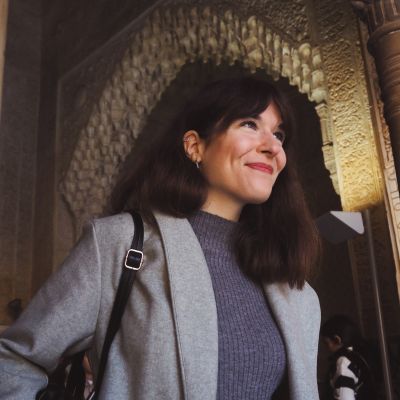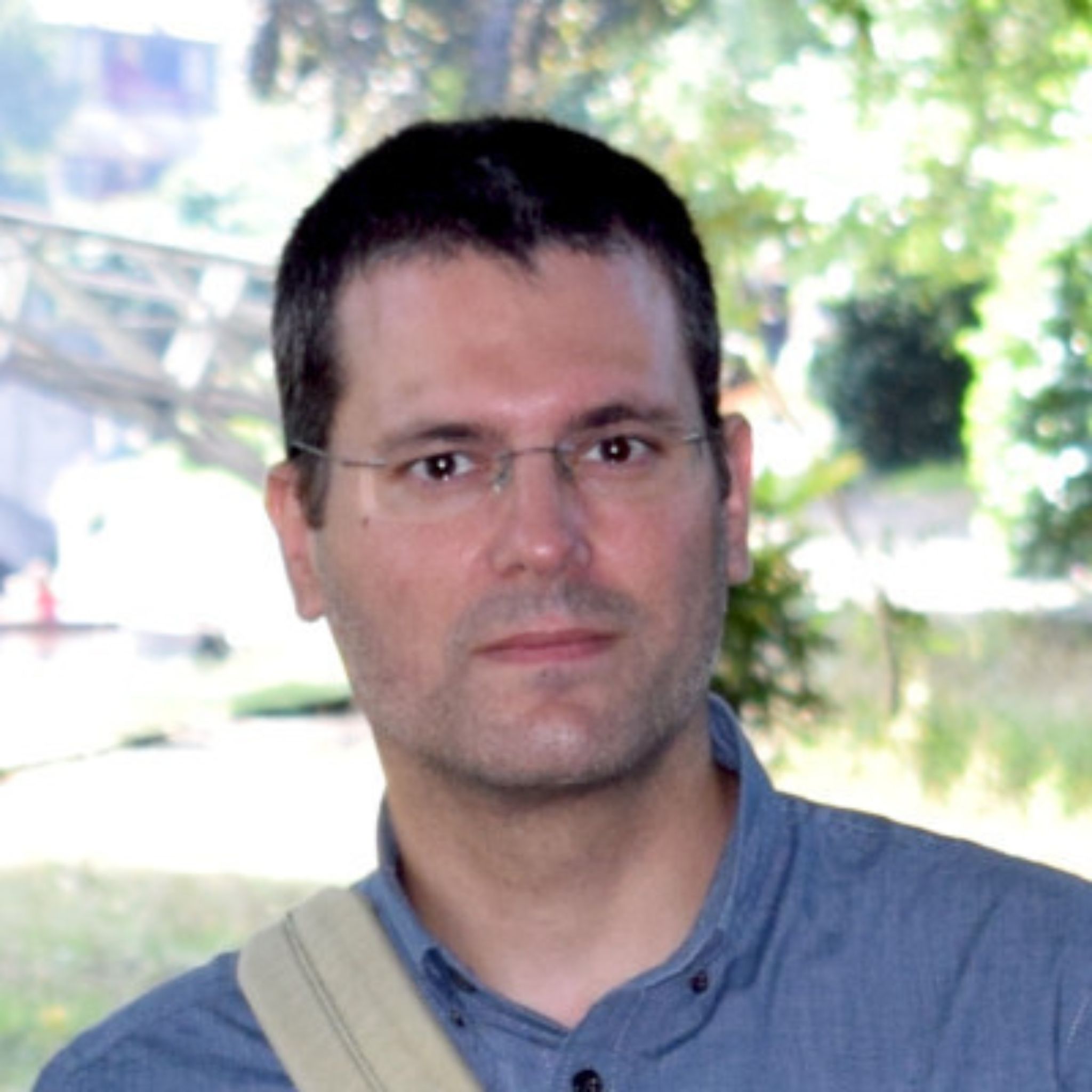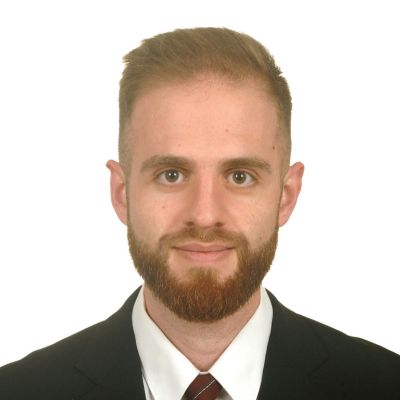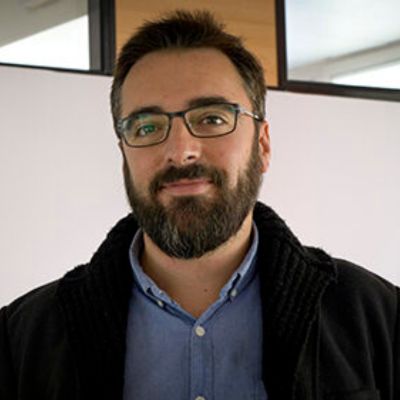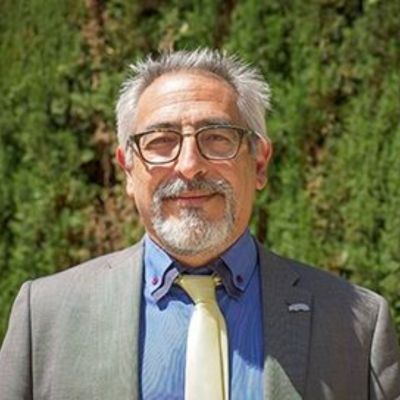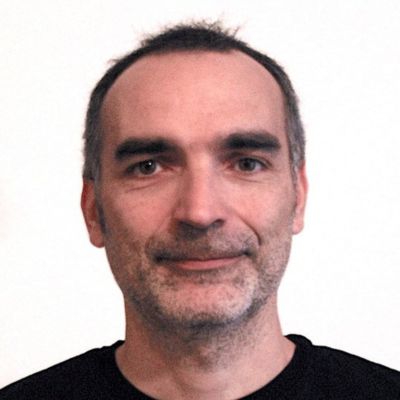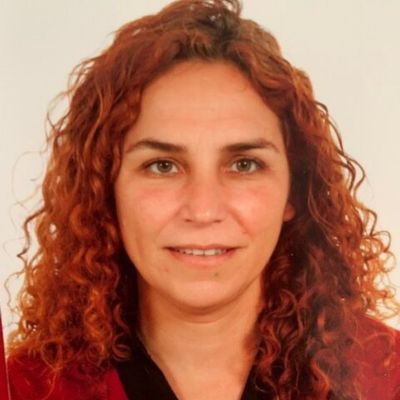Andrea is a Data Management Specialist at LifeWatch ERIC’s ICT-Core, with over 8 years of experience managing high-value environmental datasets in institutional and research projects. She previously worked at the University of Granada, where she managed long-term ecological data and collaborated closely with researchers, managers, and technicians at the Sierra Nevada Global Change Observatory and multiple research projects. Her main tasks involve designing and implementing Data Management Plans following European guidelines and FAIR principles, designing data services from a fitness-for-use perspective, harmonising data from different sources, storing (meta)data in open-source solutions, providing technical consultancy on data management, and collaborating with professionals from different backgrounds. She has also collaborated with international networks such as GBIF and eLTER.
Houda Ben Salah
Houda Ben Salah is a Software Engineering specialising in Data Science and Artificial Intelligence, with strong expertise in machine learning, natural language processing, and deep learning. She has worked on a wide range of Software, AI and data-driven solutions, showcasing the ability to translate complex challenges into practical, innovative outcomes.
She is recognised for her analytical mindset, adaptability, and problem-solving skills, and thrives in collaborative, international environments.
Fluent in English, French, Arabic, and with knowledge of German and Italian, Houda brings a global perspective and a passion for applying AI to drive impact in fintech, automotive, and sustainable innovation.
José Luis Fernández Rueda
José Luis Fernández Rueda is a Computer Engineer with a Master’s degree in Intelligent Systems and two decades of experience specialising in the implementation of algorithms for the processing of large-scale datasets. He began his career working in Digital Image Processing and Geographic Information Systems, before transitioning into Biomedical Research, where he has taken on a hybrid role as both a data scientist and a developer, working on low-level applications and distributed systems for the processing of large-scale omics data.
As a member of the development team at LifeWatch ERIC, he contributes to the development of the organisation’s software infrastructure.
Main publications:
Méndez-Vidal, C., Bravo-Gil, N., Pérez-Florido, J., Marcos-Luque, I., Fernández, R. M., Fernández-Rueda, J. L., … & Antiñolo, G. (2025). A genomic strategy for precision medicine in rare diseases: integrating customized algorithms into clinical practice. Journal of Translational Medicine, 23(1), 86.
Peña-Chilet, M., Roldán, G., Perez-Florido, J., Ortuno, F. M., Carmona, R., Aquino, V., … & Dopazo, J. (2021). CSVS, a crowdsourcing database of the Spanish population genetic variability. Nucleic acids research, 49(D1), D1130-D1137.
López-Sánchez, L. M., Jurado-Gámez, B., Feu-Collado, N., Valverde, A., Cañas, A., Fernández-Rueda, J. L., … & Rodríguez-Ariza, A. (2017). Exhaled breath condensate biomarkers for the early diagnosis of lung cancer using proteomics. American Journal of Physiology-Lung Cellular and Molecular Physiology, 313(4), L664-L676.
Salvador J. Fernández Bejarano
Salvador is a Data Management Specialist at ICT-Core, with a solid background in environmental informatics. He holds an MSc in Marine Biodiversity and Conservation and has extensive experience managing and curating research datasets in alignment with FAIR principles. His work has contributed to the FAIR publication of datasets across various disciplines, with a particular focus on geospatial and biodiversity data.
Salvador has developed and maintained research software, including R packages, to streamline data access, enhance reproducibility, and enable integration with semantic web technologies. He has been involved in the design of the European Ocean Digital Twin, helping bridge environmental data systems with real-time simulations to support data-driven decision-making. In addition, he is experienced in the use and promotion of Open Linked Data, contributing to interoperable knowledge systems that connect datasets across domains and institutions.
Since joining LifeWatch ERIC in 2025, he has applied his expertise to the design and execution of data management plans across diverse scientific projects, while also leading capacity-building workshops and supporting the wider adoption of open science practices
Main publications:
Musimwa, R., Standaert, W., Stevens, M., Fernández Bejarano, S. J., Muñiz, C., Debusschere, E., Pint, S., & Everaert, G. (2025). Climate-induced habitat suitability modelling for pelagic fish in European seas. Frontiers in Marine Science, 12. https://doi.org/10.3389/fmars.2025.1501751
Webb, T., Beja, J., Fernández Bejarano, S. J., Ramos, E., Sainz-Villegas, S., Soetaert, K., Stolte, W., Troupin, C., & Weigel, B. (2025). Realising the potential of interoperable data products to improve the outlook for marine biodiversity: Lessons from the European marine observation and data network. Marine Policy, 173, 106578. https://doi.org/10.1016/j.marpol.2024.106578
Assis, J., Fernández Bejarano, S.J., Salazar, V.W., Schepers, L., Gouvêa, L., Fragkopoulou, E., Leclercq, L., Vanhoorne, B.,Tyberghein, L., Serrão, E.A., Verbruggen, H., De Clerck, O. (2024) Bio-ORACLE v3.0. Pushing marine data layers to the CMIP6 Earth system models of climate change research. Global Ecology and Biogeography. https://doi.org/10.1111/geb.13813
Nikos Minadakis
Nikos Minadakis is a software engineer, semantic architect and large scale projects manager. He graduated from the Department of Computers Engineering and Informatics, University of Patras, and holds an MSc in Computer Science and Technology. He has expertise in e-research infrastructures design and development, conceptual modeling and semantic information systems implementation. He is a founding member of Advance Services, a deep tech enterprise and was a former technology supervisor and software engineer at the Foundation of Hellas and Technology (FORTH) from 2013 until 2019. He has participated in many National and European Projects, including PHAROS Artreseach, Lifewatch, iMarine, BlueBRIDGE and has co-authored more than 40 scientific publications.
Main publications:
1. N. Minadakis, Y. Marketakis, H. Kondylakis, G. Flouris, M. Theodoridou, M. Doerr, G. de Jong. “X3ML Framework: An Effective Suite for Supporting Data Mappings”. Workshop for Extending, Mapping and Focusing the CRM – co-located with TPDL’2015, Poznan, Poland, September 2015.
2. N. Minadakis, Y. Marketakis, C. Bekiari, M. Doerr, N. Bailly, A. Gougousis, S. Nikolopoulou, D. Mavraki, C. Arvanitidis. “LifeWatch Greece Data-Services: On Supporting Metadata and Semantics Integration for the Biodiversity Domain”. In 13th International Congress on the Zoogeography and Ecology of Greece and Adjacent Regions (ICZEGAR’2015), Heraklion, Crete, October 2015.
3. C. Arvanitidis, E. Chatzinikolaou, N. Bailly, E. Panteri, C. Bekiari, M. Doerr, N. Minadakis, Y. Marketakis, S. Faulwetter, K. Keklikoglou, D. Mavraki, S. Nikolopoulou, A. Oulas, E. Pafilis, N. Pattakos, C. Pavloudi, T. Patkos, K. Varsos, V. Gerovasileiou, T. Bourtzis, J. Lagnel, A. Gougousis (and 29 others). “LifeWatchGreece: Construction and operation of the national Research Infrastructure in the framework of the LifeWatch ESFRI”. In 13th International Congress on the Zoogeography and Ecology of Greece and Adjacent Regions (ICZEGAR’2015), Heraklion, Crete, October 2015.
José Antonio Zaíño Rodríguez
Full Stack Engineer at LifeWatch ERIC.
He holds a degree in Telecommunication Technologies Engineering and a master’s degree in Telematics and Telecommunication Networks. He specialises in full stack software development, working on both frontend and backend technologies. Since 2020, he has been working in the private sector, focusing on building and optimising software solutions. Currently, he is developing the LifeWatch Search Engine, available at search.lifewatch.eu.
Francisco Manuel Sánchez Cano
e-Infrastructure Resource Integration Coordinator
Holds a degree in Computer Engineering with extensive experience in sensor networks, IoT architectures, and research infrastructure integration. Since 2018, he has led resource integration in LifeWatch ERIC’s e-Infrastructure, though his involvement dates back to 2012, with key roles at Centrum Wiskunde & Informatica (CWI, Amsterdam) and the Doñana Biological Station (CSIC), where he played a pivotal role in the process that led to LifeWatch becoming an ERIC.
He previously worked at the Spanish National Research Council (CSIC) and at the Sierra Nevada Global Change Observatory (University of Granada), focusing on IoT and sensor networks for scientific infrastructures. Earlier, he gained international experience in Austria, working on distributed component communication in a flight simulator research project at Technische Universität Graz & Joanneum Research.
With expertise in scientific computing, smart systems, and data-driven infrastructures, he bridges IT solutions with environmental and scientific research.
Antonio José Sáenz Albanés
Director of ICT-Core
ICT professional with over 30 years of experience in both the private and public sectors. He has managed large-scale distributed infrastructures with ITIL-based operations and served as CTO, advocating for open-source technologies and standards-based software development, fostering collaboration and technical excellence.
His work spans HPC, big data, and DevOps, leading the deployment of Virtual Research Environments and coordinating cloud security and operations for large-scale solutions. Additionally, as an associate lecturer, he has contributed to bridging academic knowledge and real-world innovation by sharing enterprise-scale project management insights.
Xavier Rotllan-Puig
Agricultural Engineering specialised in ecology and biodiversity conservation. His research first focused on Mediterranean endemic and threatened flora, exploring plant reproductive processes and their interactions within ecosystems, later expanding to ecological modelling and spatial data analysis.
He has worked in several research centres and protected areas in Spain and Italy, gaining hands-on experience in conservation projects and biodiversity monitoring. From 2015 to 2021, he was a data analyst, GIS developer and consultant at the Joint Research Centre (EC-JRC), contributing to projects on greenhouse gas emissions, land productivity, and environmental indicators. In 2021, he became a Project Officer at the EC-JRC, focusing on analysing extensive data sets to develop indicators related to biodiversity and agriculture. During this time, he also gained experience at the intersection of science and policy.
In 2024, he joined LifeWatch ERIC as a Data Management Specialist, where he is involved in the entire data life cycle for agroecology and soil science projects, including Agroecology, SUS-SOIL, PATH2DEA and AgroServ.
Xavier has co-authored several scientific publications, on ecology, biodiversity conservation, plant biology and ecological modelling, with a strong focus on integrating data-driven approaches. Additionally, he has developed and maintains several R packages for ecological analysis and biodiversity research.
Main publications:
- https://www.sciencedirect.com/science/article/pii/S1470160X2401121X?via%3Dihub
- https://www.sciencedirect.com/science/article/abs/pii/S0304380020304191?via%3Dihub
- https://www.sciencedirect.com/science/article/pii/S1470160X21010517?via%3Dihub
Mariela Pino García
Holds a degree in Statistical Sciences and Techniques and a PhD in Social and Legal Sciences. She has over 15 years of experience in a multinational technology company, where she has coordinated and managed R&D&I projects at regional, national, and European levels, both individually and in consortia. Her expertise lies in data science, expert systems, digital twins, and innovation management. She has led industrialisation projects and contributed to the execution of R&D&I initiatives related to data science. Her current work focuses on managing innovation projects, ensuring their successful development and implementation. She is passionate about leveraging data science and innovation to drive technological progress and efficiency in various sectors.
